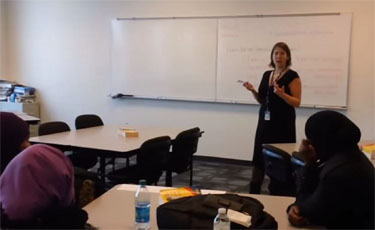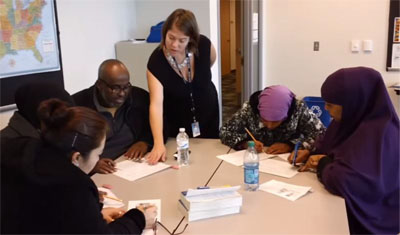- MN ABE Connect
- Archive
- Using the TIF to Foster Career Awareness
 April 18, 2015
April 18, 2015
Using the TIF to Foster Career Awareness
Stephanie Sommers, Minneapolis Adult Education Instructor / ACES TrainerFor many of us, work is every bit as much of a necessity as are food and shelter. We need to work in order to survive, and learning about work should be seen as a necessary survival skill. As such, we need to be teaching all of our adult learners about work from the moment they enter our classrooms. If I were to say this to some of my Adult Education colleagues, they would tell me that not all of their learners are looking for work or that they are not yet ready to enter the workforce. To that I have this response: Not all of our adult learners will visit the doctor or look for a new apartment in the near future, either, yet we teach these survival skills because we see them as necessary for a student’s long-term success and well-being.
Most teachers would not say that we should wait until a student is sick and badly in need of medical attention before teaching her about how to make a doctor’s appointment. So why should we wait to teach our learners about something as important as career awareness?
Developing a Future Pathway
 Fostering career awareness does not just have to mean helping learners navigate how to fill out job applications or conducting mock interviews. It is something broader and more basic. Career awareness involves helping learners to learn about all of the many career and training opportunities that are available and facilitating ways for them to explore and examine their own interests, skills, and abilities. The Developing a Future Pathway (DFP) category of the Transitions Integration Framework (TIF) is a wonderful resource for teachers who are looking for ways to build career awareness with their learners. The TIF, DFP webinar, and sample DFP lessons that can be found in the ACES resource library on the ATLAS website are a great place to start for teachers who want concrete ideas about how to grow this competency.
Fostering career awareness does not just have to mean helping learners navigate how to fill out job applications or conducting mock interviews. It is something broader and more basic. Career awareness involves helping learners to learn about all of the many career and training opportunities that are available and facilitating ways for them to explore and examine their own interests, skills, and abilities. The Developing a Future Pathway (DFP) category of the Transitions Integration Framework (TIF) is a wonderful resource for teachers who are looking for ways to build career awareness with their learners. The TIF, DFP webinar, and sample DFP lessons that can be found in the ACES resource library on the ATLAS website are a great place to start for teachers who want concrete ideas about how to grow this competency.
At the beginning level, the sample DFP lesson walks teachers through how to teach learners about conducting informational interviews as a way to learn about jobs. The lesson includes a question making activity in which learners use sentence squares to put together questions that one might ask about work. The questions are then copied onto a chart and the learners practice asking them by interviewing a partner and recording her responses on the chart.
Job Family Tree
This lesson could easily be extended, and one idea would be to do a pre-lesson on jobs to activate the learners’ background knowledge. There is a very powerful lesson idea that comes from the Integrating Career Awareness (ICA) Curriculum Guide, which is available as a free download from the National College Transition Network’s website. The lesson involves showing learners how to create something called a job family tree.
A job family tree is very much like a regular family tree, which is something that beginning level learners might typically be exposed to in a unit on family. The twist is that the learners write not only the names and familial relationships on the tree, they also write what job each person has or had.
 I say this is a powerful lesson because it is a strong reminder of what a staggering number of career opportunities there are in the United States compared to many places in the world. When I have done this lesson with my ELL learners from places like Somalia and Laos, it is not unusual for the entire family tree to be comprised of farmers or soldiers. Doing this lesson is a great way to begin conversations about a wide variety of issues, like gender roles and how they relate to work and how our families influence our views on work.
I say this is a powerful lesson because it is a strong reminder of what a staggering number of career opportunities there are in the United States compared to many places in the world. When I have done this lesson with my ELL learners from places like Somalia and Laos, it is not unusual for the entire family tree to be comprised of farmers or soldiers. Doing this lesson is a great way to begin conversations about a wide variety of issues, like gender roles and how they relate to work and how our families influence our views on work.
When I modeled my own job family tree for my learners, I talked about how my grandmother, my mother’s sister, and my mother all worked in education, so in a sense, teaching was the “family business.” I think that doing the job family tree lesson is a great way to help learners start to realize the monumental impact that our individual backgrounds have on shaping our ideas and values in regards to work. It also opens up the door to discussing the wide array of both work and educational opportunities that there are in the U.S. These discussions make great jumping off points for doing more career awareness activities, such as informational interviews.
Interested in more resources like these?
Check out the ACES resource library, as well as the ACES homepage on the ATLAS website!
Newsletter Signup
Get MN ABE Connect—the official source for ABE events, activities, and resources!
Sign UpArticle Categories
- ABE Foundations/Staff Onboarding
- ACES/Transitions
- Adult Career Pathways
- Assessment
- CCR Standards
- Citizenship
- COVID-19
- Cultural Competency
- Digital Literacy/Northstar
- Disabilities
- Distance Learning/Education
- ELA
- Equity/Inclusion
- ESL
- HSE/Adult Diploma
- Listening
- Math/Numeracy
- Mental Health
- Minnesota ABE
- One-Room Schoolhouse/Multilevel
- Professional Development
- Program Management
- Reading
- Remote Instruction
- Science
- Social Studies
- Speaking/Conversation
- Support Services
- Teaching Strategies
- Technology
- Uncategorized
- Volunteers/Tutors
- Writing